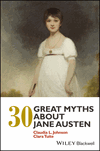IN EMMA, JANE AUSTEN CREATED A HEROINE NO ONE BUT AN AUTHOR WOULD LOVE
Summary
Jane Austen's playful malediction has become a self-fulfilling prophecy, and its ironic challenge to Emma's readers has been all but ignored. Despite its heroine's bad social form, Emma is celebrated for “the infinite delights and subtleties of its workmanship." In this novel, Austen masters her most sophisticated techniques and innovations in aesthetic form. Emma marked a turning point in Austen's career. The first of Austen's postwar novels, it was also the first published by John Murray, the prestigious publisher of Lord Byron and Sir Walter Scott, who wrote Austen's first major review. A propertied heiress with £30 000, Emma Woodhouse is Austen's most economically advantaged and socially powerful heroine. The novel might be said to aid and abet Emma's privilege, the opening sentence seeming to endorse a particularly female kind of power.



